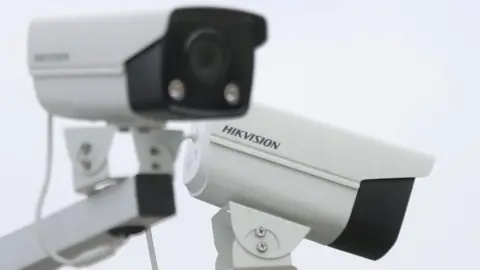CCTV watchdog criticises Hikvision Uyghur response
 Getty Images
Getty ImagesThe UK's CCTV watchdog has criticised a Chinese firm for not saying if its cameras are used in Uyghur internment camps.
Professor Fraser Sampson, said: "If your company wasn't involved in these awful places wouldn't you be very keen to say so?"
In July, MPs said Hikvision provided the "primary camera technology" used in Uyghur internment camps.
The company said it respected human rights.
On 8 July, MPs on the foreign affairs committee published a report which said: "Cameras made by the Chinese firm Hikvision have been deployed throughout Xinjiang, and provide the primary camera technology used in the internment camps".
More than a million Uyghurs and other minorities are estimated to have been detained at camps in the north-west region of Xinjiang, where allegations of torture, forced labour and sexual abuse have emerged.
China has denied the allegations and claimed the camps are "re-education" facilities used to combat terrorism.
The foreign affairs committee recommended that Hikvision "should not be permitted to operate within the UK".
In June, President Biden signed an executive order prohibiting US investments in Hikvision.
Hikvision cameras are widely used in the UK, including by many local councils.
In a letter sent to "partners" after the report's publication, Hikvision wrote that the committee's accusations were "unsubstantiated and not underpinned by evidence".
It called the suggestion of a ban a "knee-jerk response... disproportionate, ill-measured, and reinforces the notion that this is motivated by political influences".
Biometrics Commissioner
On 16 July, Professor Sampson, the UK Biometrics and Surveillance Camera Commissioner, followed up that response, asking the company if it accepted that crimes are being committed against the Uyghurs and other ethnic groups in Xinjiang.
In a reply sent this week, Justin Hollis, Hikvision's Marketing Director for UK & Ireland, wrote: "It is beyond our capability to make a judgement on this matter, particularly against a backdrop where the debate surrounding the Xinjiang issue comes with clashing geopolitical views."
The firm said it was difficult to answer "narrow pointed questions on paper", fearing what it called a "kangaroo trial by media".
It added that an "independent" report by former US Ambassador-at-Large for War Crimes Issues (2001-2005), Pierre-Richard Prosper, had concluded: "We do not find that Hikvision entered into the five projects in Xinjiang with the intent to knowingly engage in human rights abuses or find that Hikvision knowingly or intentionally committed human rights abuses itself or that it acted in wilful disregard."
The company has previously said it had retained a law firm led by Ambassador Prosper "to advise on human rights compliance".
Hikvision said it fully embraced the UN guiding principles of business and human rights.
The firm said that it did not oversee or control its devices once they are passed to installers, adding that "operational matters are not within our remit".
Simple Questions
But the letter's answers were not a satisfactory response for Professor Sampson, who told the BBC: "It's a simple enough question - 'Were your cameras used in these internment camps?'"
"Saying 'we're not involved in operations' or 'we don't have any control over what's done with them' isn't really an answer."
He wrote: "Our parliamentary committee accepted that these internment camps exist and that substantial and sustained human rights abuses are being enabled by sophisticated surveillance technology. I need to understand the level of Hikvision's involvement.
He said he was "unimpressed" with what he had heard, and remained unconvinced he was getting a "full account".
The company has invited Professor Sampson to meet Ambassador Prosper, but the commissioner says he wants answers to "basic questions" first.
Hikvision told the BBC: "We are looking forward to meeting the Biometrics and Surveillance Camera Commissioner, and have nothing to add to our letter."